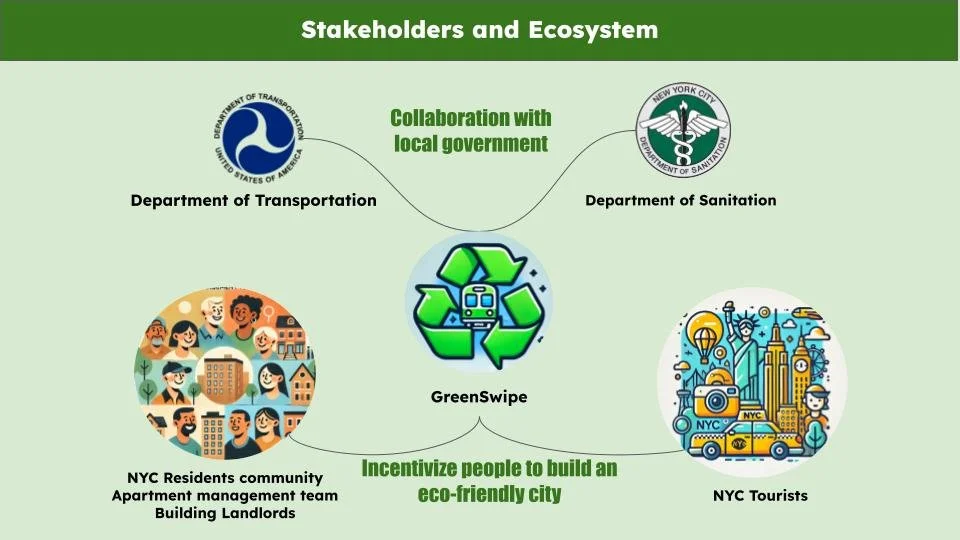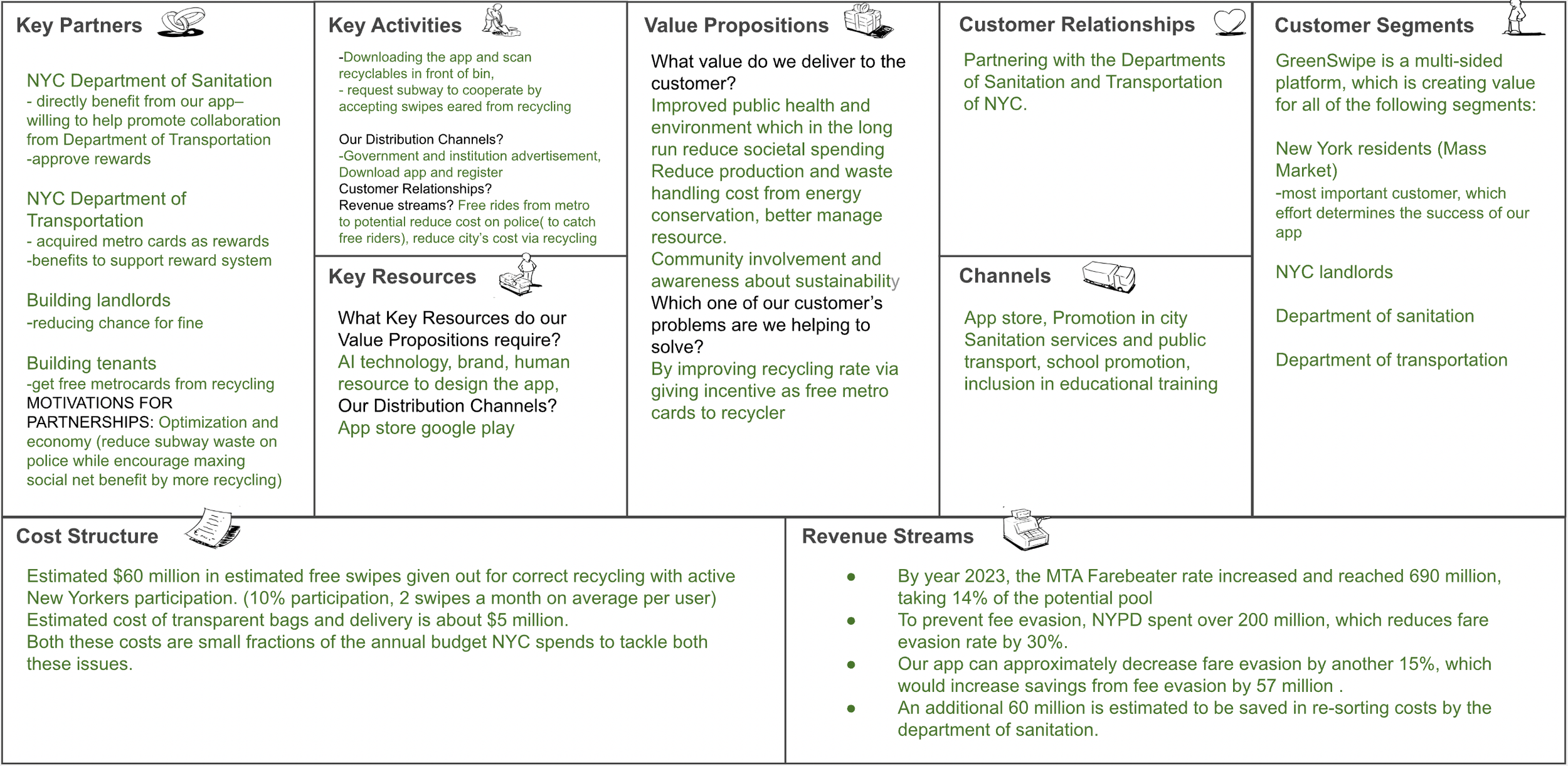GreenSwipe: Recycle Right Ride Free
Project Overview: GreenSwipe was developed as a part of Harry West's IEMEE 4200 Human-Centered Design & Innovation course at Columbia University; the prompt for the Fall 2024 semester was to design a product that would make "New Yorkers better". NYC’s recycling rate has dropped by 10% in the last seven years, indicating a lack of effective incentives and resident engagement. But a recycling pilot program has shown that New Yorkers respond to incentives - We reward users for recycling correctly and consistently with MTA MetroCard credits. Users take a photo of their recyclables in clear bags before disposal, and our AI verifies compliance to track streaks and award points. Free subway swipes incentivize participation while reducing enforcement costs by the city for curbing fare evasion - and a cleaner city lowers waste management expenses and boosts public savings overall.
My Role: Product Designer and Engineer
Product Design
- Human Centered Design
- Research
- User Interviews
- Prototyping
- Figma Software
- User Experience
Business Modeling
- Value Proposition
- Business Model Canvas
- Competition Analysis
- Pitch/Advertisement
Deliverables
- Concept Development Case
- Product Pitch Video
- Positive User Feedback
Key Outcomes:
Voted Top 2 overall by class, TAs, and Harry West
Designed and developed a novel human-centered product, leveraging new design methods that focus on problem-first thinking, supported by real stakeholder interviews.
Design and Development Process:
Target Audience/Problem Area:
Our target customers are NYC residents who regularly dispose of trash and recyclables but lack motivation to consistently sort them due to time constraints and limited perceived benefits. This includes both environmentally conscious and unconscious individuals, many of whom are also burdened by high subway fares. This disconnect between residents and recycling efforts contributes to a broader issue for the city. The NYC Department of Sanitation faces rising costs from increased landfill waste, more complicated sorting, and lost revenue from recyclable materials. Landlords also face fines for improper waste disposal, further compounding the problem. Meanwhile, the NYC Department of Transportation is impacted by high fare evasion, low subway ridership, and the cost of policing the subway system. These interconnected challenges highlight the need for a solution that addresses both waste management and public transportation efficiency.
Prototyping:
User Experience:
GreenSwipe offers New York City tenants an effortless and rewarding way to recycle, all without leaving their residential buildings. This seamless process not only promotes environmental responsibility but also provides tangible benefits, such as free MTA rides, by encouraging proper and consistent recycling. By tracking users’ recycling habits through the app, GreenSwipe helps increase NYC’s recycling rates while addressing fare evasion issues within the Department of Transportation.
When users first open the app, they are directed to the “Home” tab, where they can register up to three recycling bins in their building and request free clear recycling bags to be delivered directly to their address. When ready to recycle, users head to the “Recycle” tab and take a photo that includes their registered recycling bin and the recyclables inside the provided clear bag. The app verifies that users are near a registered bin and that the contents are recyclable. This process also allows users the flexibility to drop off their recyclables at a recycling plant for cash value without forfeiting their redeemable points. Upon confirmation, users earn 10 points per recycling scan and an additional day counted toward their recycling streak. Consistent participation is rewarded, as recycling streaks increase the number of points earned per scan, motivating ongoing engagement. With just 30 points—achievable in as few as three scans—users can redeem an MTA swipe.
Points can be easily traded for swipes through the app’s “Redeem” tab. These swipes are then loaded onto the user’s Apple or Google Wallet, allowing for quick and convenient access on buses or subways. By making recycling convenient and rewarding, GreenSwipe empowers tenants to positively impact their environment and reduce commuting costs. This innovative system not only supports sustainability by boosting recycling rates but also contributes to social good by addressing fare evasion and encouraging community participation in environmentally friendly practices.
Product Delivery:
GreenSwipe is a tool for NYC’s Departments of Sanitation and Transportation to improve recycling rates, reduce street litter, and curb fare evasion. The app uses machine learning (ML) to validate recyclables in users' personal bins by scanning clear bags. If prohibited items are detected, users get real-time feedback to correct their disposal without penalties. The system rewards users with points based on streaks, with flexible engagement—one scan per day, and users maintain streaks by recycling at least once a month. GreenSwipe requires no extra infrastructure, relying on users' existing bins and the ML model for validation, making it scalable and easy to integrate into current systems.
Supporting Technology:
Data Gathering: Users register by uploading a photo of their recycling bin, creating a unique bin profile via AI object recognition. Each recycling session involves a photo processed in real-time using convolutional neural networks (CNNs) for waste classification and computer vision for bin verification. Metadata like timestamps and geolocation ensures proper use and tracks recycling behavior.
AI Algorithms: The AI uses pre-trained models fine-tuned with labeled recycling datasets to classify waste and verify bins. Edge detection and image-matching algorithms ensure accuracy. Backend servers calculate streaks, assign points, and dynamically adjust rewards. Periodic retraining improves AI performance over time.
User Interface: The app offers a seamless interface for recycling validation and rewards management. It connects to cloud-hosted APIs for real-time processing, displays user dashboards with streaks and points, and sends notifications to encourage participation.
Rewards Redemption: Points are stored securely and redeemed via integration with the MTA system. The app uses APIs to generate QR codes or link to MTA accounts, ensuring smooth subway swipe redemptions while synchronizing point balances.
Integration with NYC Services: The app aligns with NYC recycling guidelines and partners with the Department of Sanitation for compliance.
Competition:
Value Propositions:
NYC residents: Our app can give users instant feedback on recycling efforts and reward them for contributing to a more sustainable city. They can earn MTA swipes by simply recycling correctly, which reduces their daily transportation costs. It also makes them feel good about being environmentally conscious. A culture of recycling and a sense of community can be formed among people as they encourage each other to use the app for a better city.
Property Management Companies: Participating in the recycling reward system can be promoted as an added value, and with tenants complying to recycling guidelines, contamination rates would be lower, making it easier for management team to meet city recycling requirements.
Business Model Canvas:
NYC Department of Transportation: Fare evasion has plagued the NYC Department of Transportation, losing over $700 million in revenue. Mitigation plans, including increased police presence and new turnstile systems, have cost the city upwards of $1.5 billion. By rewarding users with MTA swipes, our app encourages more residents to use public transit, potentially increasing the overall ridership and decreasing fare evasion.
NYC Department of Sanitation: The NYC department of sanitation has a $2 billion annual budget, and more accurate sorting could potentially save up to $60 million annually. Our app provides direct incentives for people to recycle properly, leading to measurable improvements in recycling rate and waste management. It also provides data-driven insights to help identify areas with low recycling engagement, informing future campaigns and initiatives.





